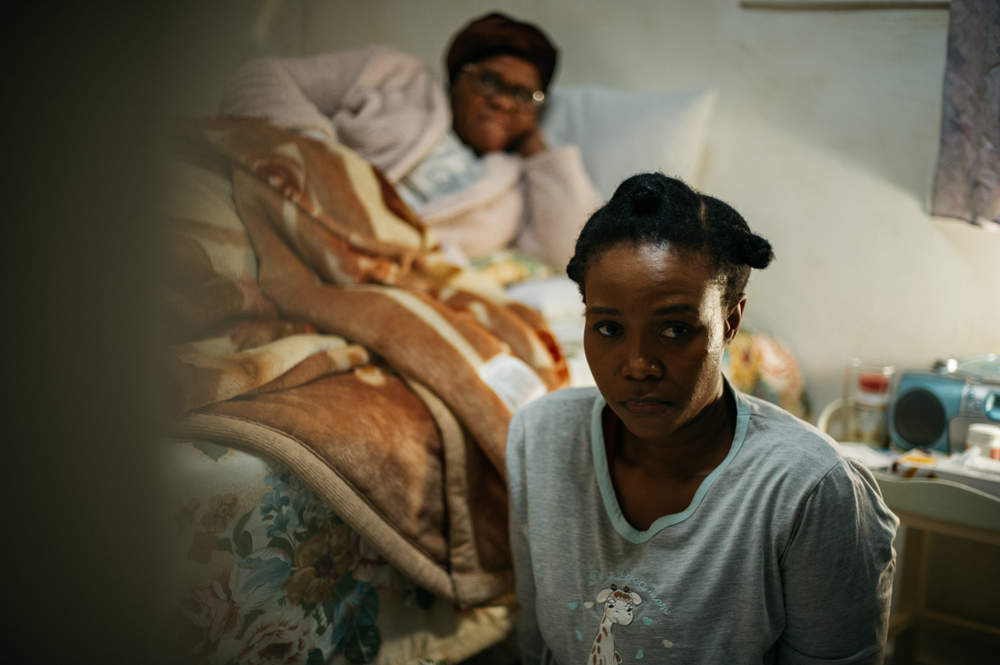There are times in “Mlungu Wam (Good Madam)” in which the nerves of Tsidi (Chumisa Cosa), a mother who reluctantly returns with her daughter Winnie (Kamvalethu Jonas Raziya) to the house where she grew up, owned by a wealthy bed-ridden Cape Town widow named Diane (Jennifer Boraine) but long cared for by her mother Mavis (Nosipho Mtebe), can feel as fragile as porcelain. To Tsidi, it felt like something died there long before Diane retired upstairs in preparation for her own funeral, with Mavis refusing to let up on a routine of dusting counters and polishing plates in the kitchen, even if no one’s there to appreciate it, so strong is her sense of duty, yet it’s left a mess of her own family where her presence was sorely missed and it seems from the trembling of fine china that accompanies every step her daughter and granddaughter take in the house that something’s about to break.
“I don’t like to waste any any pixel in a frame, so every little piece of set dressing has meaning,” says Jenna Cato Bass, who with her co-writer and producer Babawla Baartman took great pains to put together the film’s production design, accounting not only for how backgrounds would look in “Good Madam” but how they would sound. “It was a really fun part of the process.”
It is just one way of many that Bass and Baartman are able to pick apart something much larger through something small in “Good Madam,” which illuminates the psychic grip that living under apartheid continues to have in South Africa for the Black community. With the three generations of women in Mavis’ family under one roof for the first time in a house that still doesn’t belong to her, the film uses a house with multiple corridors to explore how culturally ingrained attitudes continue to divide a bloodline as Tsidi continues to be bewildered by her mother’s devotion to Diane and feels neglected by her while she strives to do right by Winnie, who can’t help but wonder what’s going on in the second floor of the house, which she’s been forbidden from visiting. Bass and Baartman pique the audience’s interest in what’s upstairs as well, wringing as much suspense as they can from a slow reveal while making the horror immediate of a society where one is forced to live in fear on a daily basis.
Following the film’s premiere last fall in the Midnight Madness section of the Toronto Film Festival, “Good Madam” is arriving in America by way of the streamer Shudder today and Bass and Baartman graciously took the time to talk about a production as intense as the thriller itself when having to be conscious of COVID restrictions and how they’re able to get at a greater truth in blending ensembles of nonprofessional and professional actors and allowing them greater authorship over their roles than most.
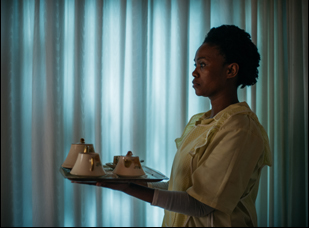
Babalwa Baartman: When Jenna and I started working together on a previous short that we did prior to doing “Mlungu Wam,” it’s a process that she had already been using and I absolutely loved it. Once we have the cast, we share the concept or our direction that we want to take with the characters and then we usually encourage the cast members to give their opinion of what they think of the character and what kind of decisions they would make, so it’s highly collaborative and it’s incredibly helpful when we are dealing with the subject matters that we deal with, particularly with this film where we’re talking about generational trauma within a household of black women and inequality that is still in South Africa. We have our views on it, but it’s a communal story, so having that contribution gives layers and depth to the story.
Jenna Cato Bass: Yeah, there was a big moment for me when I was a film student and I encountered Mike Leigh for the first time. I remember being like, “How does he make films like that? How does he write characters and dialogue like that?” Obviously, I looked into his process, and I was like, “oh my God, this is another way of doing it where we as writers can admit that we don’t know everything and that the people who are going to be playing these characters on screen have something really great to contribute to the process of writing rather than putting words in people’s mouths.” So it’s not that we follow a process at all – like Mike Leigh, I wish we could have six months of development with the cast, but we do a shortened, bastardized version of Mike Leigh’s process. [laughs] And much as I still do write traditional scripts, there’s something really magical and you can’t replicate [about this collaboration] no matter how amazing a writer you are if you do everything on your own.
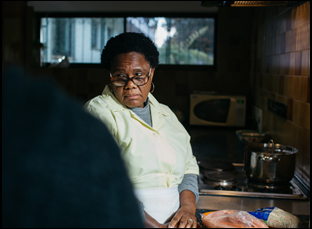
Jenna Cato Bass: Definitely. I always enjoy combining actors with nonactors. You get something out. They have very different life experiences and on one hand [in this film], you have these two people who understand some things about each other, but there’s also just such a huge gap between them and coming from different angles in their approach to acting was really interesting. Also Chumisa was amazing with how she really nurtured Nosipho and the way they worked together really contributed to the bond that they have onscreen, which is a weird kind of connection, but it’s very much like [how] they really worked together in interesting and really beautiful ways.
Was the idea of these three generations under one roof foundational to this?
Babalwa Baartman: Yeah, it’s a very common dynamic in our country where you have a mother who works full-time as a domestic worker and takes care of the family, so there was no way that we could tell the story between Mavis and Madam and not add what Mavis has lost in this world of servitude that she’s in — what has she left behind and what impact does that have to her family? Just thinking about Tsidi and her daughter, it really spoke to themes of generational trauma and it’s a conversation that we have all the time, like what have we inherited from inequality and how does that impact how we then raise our children, just going forward when you’re trying to do better, but the way the systematic racism has worked, we find ourselves in the same trap. It’s like we have slightly better opportunities, but we can’t seem to step away from that. Tsidi’s character was really just about confronting that head on, going to the source, which is her mother and that’s leading her to then also confront the bigger monster, which is Madam.
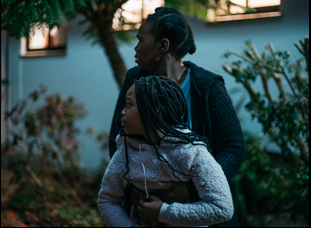
Jenna Cato Bass: The house was always going to be really important to this film [while] most of our screen time would be spent in this house, we really needed to find a place that worked cinematically as well as the fact we were shooting it during COVID, so we also had to find a location where we could also quarantine everyone together during the shoot, so it also had to be basically big enough for our whole crew to stay there. Whenever I approach low-budget filmmaking, I look at what I can do with what I have and I thought surely if I just ask around, there’s so many unoccupied mansions in Cape Town, I could find one that we could use, but then the pandemic hit and we ended up having to do what I really didn’t want to do, which is rent a house and pay a lot of money to somebody that owns many properties and doesn’t need the money. We did end up finding this one by accident. We actually were there to see a much more modern house and when we told the estate agent why we were looking, it was like, “Oh, have you seen this creepy old house that’s on the same property,” and she took us there and probably when I saw the carpeted staircase up to Madam’s room, that was for me like, “This place is amazing.” It had a whole lot of other issues, but it ended up being a very special, weird place to make the film.
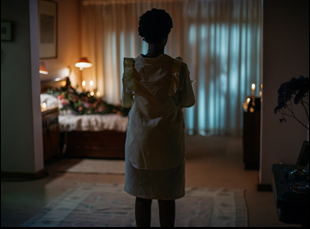
Babalwa Baartman: The only positive was me getting COVID. [laughs]
Jenna Cato Bass: She tested positive on our very first day of production…but after having isolated for two weeks. It was really rough.
Babalwa Baartman: I think it was quite stressful for Jenna because we had spent the first two weeks to go over the script and workshop the script a bit more with the characters, but after I got better and came into the house, what I think was important to us was to really just create a synergy and an atmosphere in the space where everyone felt at home. During the pandemic, everyone was grateful to be working and that energy just contributed so much to the film.
Jenna Cato Bass: And nowadays, on bigger productions, everyone’s tested or maybe less so these days, but everyone’s tested all the time, but when you’re working on such a small budget, every COVID test you have to pay for and COVID tests were, especially back then, very, very expensive and there were no antigen tests, you could only take PCR tests. So it was very stressful, but we wanted to give people work and I’m so glad we went for it and came out the other side.
Babalwa Baartman: I say to Jenna all the time, I don’t know how else I’ll be able to make films because it was just so easy for everyone to be present and to step up and go over and beyond because we were all just so invested in making it work, considering just how high risk almost every single day was. Every cough had us worrying. We were a small crew of 18 at most in the house at a time, so it was a bit stressful, but it was a responsibility we all took on because we wanted to make it work. [laughs]




